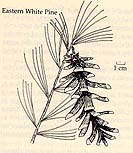

Ecological requirements tend to control the order in which different species arrive
 Example:
Eastern White Pine is able to survive on poor, dry soil, with no
shade. Hemlock requires a richer moister soil and shade
(Raven and Johnson,
1992). As a result, the
migration of the two species did not occur simultaneously. Hemlock
did not start north until approximately 1000 years after White Pine
due to its specific ecological requirements
(E.C. Pielou,
1991).
Example:
Eastern White Pine is able to survive on poor, dry soil, with no
shade. Hemlock requires a richer moister soil and shade
(Raven and Johnson,
1992). As a result, the
migration of the two species did not occur simultaneously. Hemlock
did not start north until approximately 1000 years after White Pine
due to its specific ecological requirements
(E.C. Pielou,
1991).
 Example:
Evidence shows that White Spruce consistently arrived first into an
area relative to Black Spruce. The White Spruce is able to grow on
inorganic, newly uncovered soil. Black Spruce must lag behind as it
requires spongy organic soil where moss has accumulated
(J.D. Sauer,
1988).
Example:
Evidence shows that White Spruce consistently arrived first into an
area relative to Black Spruce. The White Spruce is able to grow on
inorganic, newly uncovered soil. Black Spruce must lag behind as it
requires spongy organic soil where moss has accumulated
(J.D. Sauer,
1988).